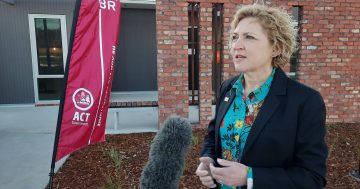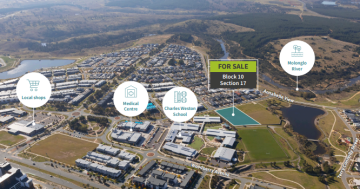
Canberra mum and lawyer Kate Steen has welcomed news that plans for a residential eating disorder centre in Coombs are moving forward, but she says the ACT has a bit of catching up to do. Photo: Kate Steen.
The ACT Government has released the design tender for Canberra’s $13.5 million residential eating disorder centre in Coombs.
News that plans for the centre are moving forward has been welcomed by advocates – including David Quilty from Eating Disorders Families Australia (EDFA) and local advocate Kate Steen – who have been calling on the ACT Government to review and address what they say is a lack of available services for people with eating disorders.
Both say more work is still needed to address gaps in the ACT’s eating disorder support services.
According to the ACT Government, the centre will create a home-like space in which people with eating disorders can receive specialised support on their recovery journey. This will include intensive nutritional and psychological treatment to help people have safe, healthy relationships with food and exercise.
Funding has been secured from the Federal Government.
Having watched his daughter fight anorexia nervosa for many years, Mr Quilty knows firsthand there is a need for more eating disorder services, particularly for young adults, in the ACT.

The ACT-based director of support group Eating Disorders Families Australia, David Quilty, has warmly welcomed news of the tender going out for the residential eating disorder centre in Coombs. Photo: Eating Disorders Families Australia.
Mr Quilty is now the ACT-based director of the EDFA support group, and he sits on the reference group that’s been collaborating with the ACT Government on the Coombs centre.
While he is somewhat concerned by the fact the centre won’t be delivered until mid-2023, according to the latest estimate, he said the tender going out is a “positive step forward in the right direction”.
“We’d love this to be more advanced,” said Mr Quilty. “It was originally going to be finished by the end of this year, but that being said, the government is certainly very committed to it.”
Ms Steen is a Canberra mother and lawyer who has bravely spoken out about her experience navigating the support services available to people in the ACT with an eating disorder.
She echoed Mr Quilty’s sentiments, and said while the tender process is a welcome step forward, the ACT still has a bit of catching up to do.
“I hope it will be a beautiful, calming and healing space that fosters recovery,” said Ms Steen.
ACT Minister for Mental Health Emma Davidson said the residential centre will complement other services in the ACT such as the eating disorders program, the early intervention service, the clinical hub, primary care and inpatient services.
Moving forward, advice will be sought from people with lived experience of eating disorders throughout the design and consultation process, with Ms Davidson saying this “will be paramount to ensure the government can appropriately meet the needs of people who face barriers receiving inpatient or outpatient support”.
Mr Quilty said seeking the advice of people with lived experiences will be vital in ensuring the centre’s success.
“On the reference group, there are people who have eating disorders, people who have recovered from them, and those who have cared for others with them.”
Mr Quilty said there has been good input throughout the process, and he hopes it will continue.
He and Ms Steen both say significant gaps remain in the ACT’s eating disorder support services, with the most profound of these being the lack of inpatient or acute hospital beds for anyone above the age of 18 with an eating disorder.
Ms Steen said many community-based eating disorders services are currently at capacity, while Mr Quilty pointed out that access to psychologists, psychiatrists, dieticians and GPs who specialise in this area is very challenging because waiting lists are so long.
But for now, both advocates look forward to seeing the centre progress during the coming months.
If you are concerned about an eating disorder or body image issues and need support for yourself or someone you care about, the Butterfly Foundation’s support line is available on 1800 334 673 (1800 ED HOPE).
If you or anyone you know needs mental health support, contact Lifeline on 13 11 14 for 24-hour crisis support. In an emergency, call triple zero (000).


















